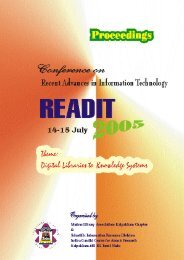READIT-2007 - Indira Gandhi Centre for Atomic Research
READIT-2007 - Indira Gandhi Centre for Atomic Research
READIT-2007 - Indira Gandhi Centre for Atomic Research
Create successful ePaper yourself
Turn your PDF publications into a flip-book with our unique Google optimized e-Paper software.
6. KNOWLEDGE MANAGEMENT: COMMON AND CHALLENGES<br />
Most of the challenges in knowledge management primarily stem from the<br />
types of knowledge reuse situations and purposes. Knowledge workers may produce<br />
knowledge that they themselves reuse while working. However, each knowledge reuse<br />
situation is unique in terms of requirements and context. Whenever these<br />
differences between the knowledge re-use situations are ignored, the organization<br />
faces various challenges in implementing its knowledge management practices. Some<br />
of the common challenges resulting due to this and other factors are listed below.<br />
1. Data Accuracy: Valuable raw data generated by a particular group within an<br />
organization may need to be validated be<strong>for</strong>e being trans<strong>for</strong>med into normalized or<br />
consistent content.<br />
2. Data Interpretation: In<strong>for</strong>mation derived by one group may need to be mapped to<br />
a standard context in order to be meaningful to someone else in the organization.<br />
3. Data Relevancy: The quality and value of knowledge depend on relevance.<br />
Knowledge that lacks relevance simply adds complexity, cost, and risk to an<br />
organization without any compensating benefits. If the data does not support or truly<br />
answer the question being asked by the user, it requires the appropriate meta-data<br />
(data about data) to be held in the knowledge management solution.<br />
4. Ability of the Data to Support/Deny Hypotheses: The organization could cleanse<br />
the system of very old files, thus diluting its own knowledge management initiative.<br />
Alternatively, it could set up another team to cleanse the database of redundant files,<br />
thus increasing its costs substantially. Apart from these, the real challenge <strong>for</strong> an<br />
organization could be to monitor various departments and ensure that they take<br />
responsibility <strong>for</strong> keeping their repositories clean of redundant files.<br />
5. Legitimacy: In the print-only world, there has been a complex but well-defined<br />
system of content validation and description that involves librarians, referees,<br />
reviewers and publishers. After going through the various defined processes, its<br />
selection gave that material a legitimacy that students and scholars came to depend<br />
upon. Furthermore, technological advances and collaborative ef<strong>for</strong>ts have allowed the<br />
costs of this process to be reduced through shared electronic cataloging (e.g. OCLC)<br />
and through the purchase or licensing of abstracting and indexing electronic<br />
databases. Librarians recognized ages ago that the only scalable and af<strong>for</strong>dable<br />
approach to such processes was to take advantage of leveraged and shared resources.<br />
6. Electronic In<strong>for</strong>mation Resources: The rise of electronic in<strong>for</strong>mation resources<br />
freely accessible through the Internet has disrupted this relatively efficient system in a<br />
number of ways. There is no clear and defined role <strong>for</strong> libraries with regard to the<br />
selection, preservation and provision of access in regard to the digital resources<br />
accessible through the net. Additionally, students and faculty have a need to learn<br />
how to evaluate these new in<strong>for</strong>mation resources, and it is far more difficult to do so<br />
on the Web than it has been in a traditional library. With a traditional library, the very<br />
fact that a book or a journal was held by a library represented a conscious set of<br />
decisions about the validity of the in<strong>for</strong>mation, and implied a filtering process that<br />
suggested a reasonable level of legitimacy. This is not true when one surfs the Web.<br />
26

















